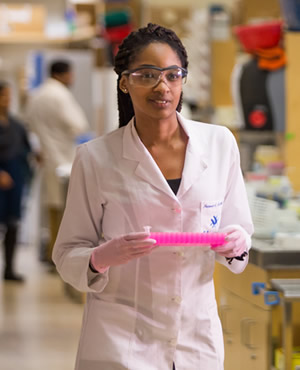Fatimat ShidiBy Dr. Sarah Keane  Fatimat Shidi is a Research Assistant in Dr. Remy Bordonné’s laboratory at the Institut de Génétique Moléculaire de Montpellier (IGMM). Fatimat received her undergraduate degree, a Bachelor of Biotechnology from the Federal University of Alfenas, Brazil. In 2013, she was awarded a full scholarship from ‘Science Without Boarders’ to further her education abroad. Through this program, Fatimat participated in an exchange program with the University of Northern British Columbia (UNBC), Canada, where she began a research project with Dr. Stephen Rader. This internship provided Fatimat with her first RNA-related research experience, working on a splicing project aimed at the reconstitution of C. merolae U5 snRNP. Upon completion of her undergraduate studies, Fatimat moved back to UNBC where she earned her M.S. in Biochemistry with Dr. Rader. She found that the vibrant research environment, picturesque setting, and strong community of international students made UNBC the perfect place for her to study, work, and live. Through her MS studies, Fatimat learned to “deal with challenging questions by focusing on the solutions instead of the difficulties.” While completing her M.S. studies, Fatimat was awarded the MITACS Globalink Research Award. This award allowed her to spend time in the Bordonné lab, learning new techniques to further her M.S. project. It was this opportunity that helped her secure her current position as a Research Assistant in the Bordonné lab. Fatimat continues to be fascinated by the spliceosome, and her current position allows her to continue studying this fascinating RNP. Her research project is aimed at characterizing molecular defects of novel U4 snRNA variants that are responsible for a rare autosomal recessive disease. One of her favorite aspects of this project is working collaboratively with people from different backgrounds towards a shared goal.
Fatimat has “always been passionate about science,” perhaps inspired by her father, who is also a scientist. However, it wasn’t until her internship in Canada that her love of research really blossomed. Now, having worked in research labs in Brazil, Canada, and France, Fatimat has seen the similarities and differences in support for science research in these countries. She finds that Brazil, Canada, and France all suffer from a similar problem related to science communication; she has noticed that it is difficult to convince people that are not in the research field, including politicians, about the importance of fundamental scientific research. “People expect an obvious link between every project and the product that can come out from the project, such as a drug or a vaccine, in a short period of time.” Furthermore, as an international scholar, Fatimat identified communication as one of the most significant challenges she has had to overcome. “Even though English is the common language among researchers, Canadians and French communicate differently.” While English is the common language in the research lab, Fatimat believes it is important to learn the language of the country where you are working and continues to work on improving her French. Fatimat would advise students who are just getting started in their graduate studies to “choose projects that inspire and challenge you because those are the projects that allow us to learn different techniques by being creative when addressing problems.” When reflecting on her time trying to get involved in research as an undergraduate, Fatimat remembered a lot of frustration. “I ran into many obstacles since the labs were very selective.” Knowing that she wanted to pursue research and graduate training, she relentlessly looked for opportunities to work in a research lab, and after two years, she found a position in a research lab at the Federal University of Alfenas in her native Brazil where she worked on DNA barcoding of amphibians. Only one year later, she was awarded the Science Without Boarders scholarship. “Looking back, I see that the difficulties I had to join a lab were important to me, and what matters is to remain calm and keep going. I learned to turn my frustration into motivation.” Fatimat’s favorite RNA is the spliceosomal U5 snRNA. You can follow her on Twitter (@FatimatARS) or connect with her on Research Gate or LinkedIn. When Fatimat is not in the lab, she unwinds by listening to music and dancing and enjoys outdoor activities, traveling, and reading psychology books. |
